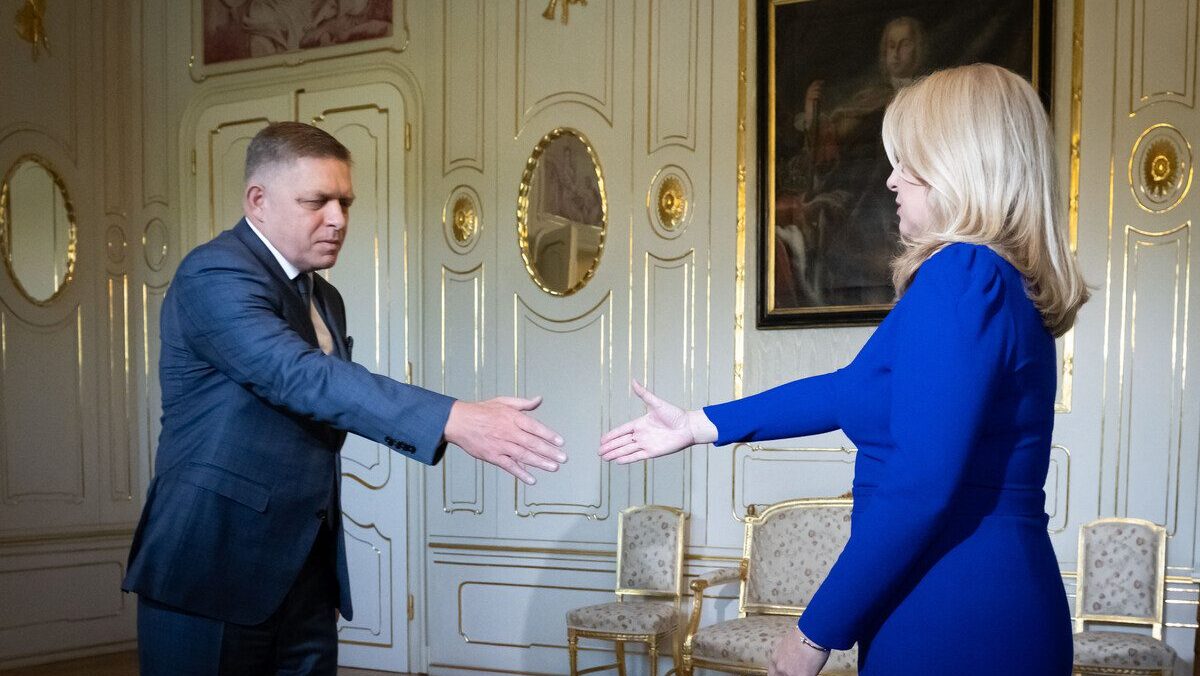
Slovak President Zuzana Caputova reaches out to shake hands with the Chairman of Smer-Social Democracy party Robert Fico for a meeting to hand him a political mandate to start negotiations to form a new government at the Presidential Palace in Bratislava, Slovakia on October 2, 2023.
Photo by VLADIMIR SIMICEK / AFP
Slovakian President Zuzana Čaputová has handed Robert Fico a political mandate to start negotiations to form a new government. Čaputová met the former prime minister on Monday, October 2nd, after his party clearly won the parliamentary elections held on Saturday.
According to the final results announced on Sunday, Fico’s left-wing nationalist-sovereigntist party, Smer—which governed Slovakia between 2006-2010 and 2012-20—received the backing of 23% of voters, gaining 42 seats in the 150-seat national parliament. This means he will need to form a coalition to gain a majority, with the most likely contenders being social democratic Hlas (27 seats) and the conservative-nationalist Slovak National Party (10 seats).
Seats
— Slovakia Elects (@SlovakiaElects) October 1, 2023
Smer: 42
PS: 32
Hlas: 27
OĽaNO: 16
KDH: 12
SaS: 11
SNS: 10 pic.twitter.com/Q2l2pOZaqP
Fico won the election on a platform that criticised EU and American meddling in Slovakia’s domestic affairs, the handling of the deepening European migration crisis, Western sanctions against Russia, and the delivery of arms to Ukraine. As many experts pointed out, the promise of a more competent government compared to the last three-and-a-half years of coalition bickering and economic mismanagement may have swayed a lot of people to choose Fico.
In a press conference on Sunday, Fico said Slovakia has bigger problems than the Ukraine issue, including energy prices and living costs, and that his party would do everything possible to start peace talks to end the war in Ukraine. He reiterated his desire to help Ukraine in a humanitarian way, but not by arming Ukraine, which the outgoing government has been doing. He also stressed that Slovakia’s foreign policy orientation would not change, but that it is of vital importance for Slovakia to have a close relationship with the Visegrád Group of Central European countries.
With regards to potential coalition partners, Peter Pellegrini, leader of Hlas—which split from Smer three years ago—may join Fico in a coalition if the government doesn’t veer away steeply from the country’s EU and NATO commitments. Fico could also offer Pellegrini a chance to run for the Slovak presidency next year with Smer’s backing, according to Slovak analyst Milan Nič, who told the Financial Times that the race was thrown open after Zuzana Čaputová said in June she would not seek re-election. The Slovak National Party would also be a natural ally as the party has been involved in previous coalitions with Smer.
Fico may have to give in to some of Pellegrini’s demands, as Hlas could choose to ally with second-placed Progressive Slovakia, a liberal, pro-LGBT rights and much more Western-aligned party, which received 18% of the votes and 32 seats in the parliament. This scenario would necessitate the involvement of two other parties for a working, but unstable majority: the Christian Democratic Movement (12 seats) and liberal-conservative Freedom and Solidarity (11 seats).
However, it seems more likely that Fico will form the new government, and this prospect has raised alarm bells in the West, as Slovakia will be more in line with the social conservative politics of Hungary and Poland, not to mention the anti-war stance of Hungary. French liberal Member of the European Parliament Valérie Hayer spoke of a “dark day for Ukraine and Western unity”, and Dutch liberal MEP Sophie in ’t Veld sarcastically tweeted that Russian President Putin “will have two seats” at the EU leaders’ table, referring to Fico and Prime Minister of Hungary, Viktor Orbán.
Not surprisingly, however, Orbán was one of the first European leaders to congratulate Fico on his victory, tweeting that it is “always good to work together with a patriot”.
Guess who's back! Congratulations to Robert Fico on his undisputable victory at the Slovak parliamentary elections. Always good to work together with a patriot. Looking forward to it! 🇭🇺🇸🇰 pic.twitter.com/JHIlYWKX6c
— Orbán Viktor (@PM_ViktorOrban) October 1, 2023
Leader of the Czech Republic’s much more EU-aligned government, Petr Fiala gave a reserved statement, saying he hopes to “continue to work closely together at government level for the benefit of both our countries.”
Se Slovenskem nás pojí nejen hluboké historické vazby, blízkost, ale i přátelské vztahy na všech úrovních.
— Petr Fiala (@P_Fiala) October 1, 2023
Sledoval jsem výsledky slovenských voleb a přeji Slovákům, ať povolební vyjednávání vedou k sestavení dobré vlády. Věřím, že budeme na vládní úrovni nadále úzce…
Ukraine has also refrained from jumping the gun, with Foreign Affairs Minister Dmytro Kuleba announcing that Kyiv respects the decision of Slovakian voters, and it would be too early to draw a conclusion based on the election results alone. The English-language Ukrainian website The Kyiv Independent, however, accused Fico of repeating Russian propaganda, when he told a crowd of supporters in late August that the war in Ukraine began “when the Ukrainian Nazis and fascists started to murder Russian citizens in Donbas and Luhansk.”
Meanwhile, Hungarian-language Slovakian news website Ma7 quoted the Russian Pravda newspaper, which believes that Fico is “totally loyal to Moscow”, and Russian analyst Vadim Trukhachev, who thinks that the results are good news for Moscow, as he sees a majority of Slovakian parties as either Russophile, relatively loyal to Russia, or neutral.
